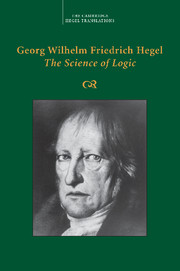Chapter 1 - The Absolute
Published online by Cambridge University Press: 30 September 2021
Summary
The simple solid identity of the absolute is indeterminate, or rather, every determinateness of essence and concrete existence, or of being in general aswell as of reflection, has dissolved itself into it. Accordingly, the determining of what is the absolute appears to be a negating, and the absolute itself appears only as the negation of all predicates, as the void. But since it must equally be spoken of as the position of all predicates, it appears as the most formal of contradictions. In so far as that negating and this positing belong to external reflection, what we have is a formal, unsystematic dialectic that has an easy time picking up a variety of determinations here and there, and is just as at ease demonstrating, on the one hand, their finitude and relativity, as declaring, on the other, that the absolute, which it vaguely envisages as totality, is the dwelling place of all determinations, yet is incapable of raising either the positions or the negations to a true unity. – The task is indeed to demonstrate what the absolute is. But this demonstration cannot be either a determining or an external reflection by virtue of which determinations of the absolute would result, but is rather the exposition of the absolute, more precisely the absolute's own exposition, and only a displaying of what it is.
THE EXPOSITION OF THE ABSOLUTE
The absolute is not just being, nor even essence. The former is the first unreflected immediacy; the latter, the reflected immediacy; further, each is explicitly a totality, but a determinate totality. Being emerges in essence as concrete existence, and the connection of being and essence develops into the relation of inner and outer. The inner is essence, but as a totality whose essential determination is to be referred to being and to be being immediately. The outer is being, but with the essential determination of being immediately connected with reflection and, equally, in a relationless identity with essence. The absolute itself is the absolute unity of the two; it is that which constitutes in general the ground of the essential relation which, as only relation, has yet to return into this its identity and whose ground is not yet posited.
- Type
- Chapter
- Information
- Georg Wilhelm Friedrich Hegel: The Science of Logic , pp. 466 - 476Publisher: Cambridge University PressPrint publication year: 2010



